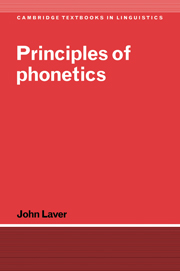Book contents
- Frontmatter
- Contents
- List of figures
- List of tables
- Preface
- Acknowledgements
- Introduction
- PART I General concepts
- PART II The analytic framework
- PART III Initiation and phonation
- PART IV Linear segmental analysis
- PART V Articulatory co-ordination and phonetic settings
- PART VI Temporal, prosodic and metrical analysis
- PART VII Principles of transcription
- PART VIII Conclusion
- Envoi
- Appendix I The phonetic alphabet of the International Phonetic Association
- Appendix II Index of languages
- References
- Index of names
- Subject index
- Frontmatter
- Contents
- List of figures
- List of tables
- Preface
- Acknowledgements
- Introduction
- PART I General concepts
- PART II The analytic framework
- PART III Initiation and phonation
- PART IV Linear segmental analysis
- PART V Articulatory co-ordination and phonetic settings
- PART VI Temporal, prosodic and metrical analysis
- PART VII Principles of transcription
- PART VIII Conclusion
- Envoi
- Appendix I The phonetic alphabet of the International Phonetic Association
- Appendix II Index of languages
- References
- Index of names
- Subject index
Summary
The objective of this book has been to offer the reader an analytic perspective on phonetics, as a foundation for research in speech. The Introduction began by saying that speech is our most human characteristic. To speak is to display the most open declaration of our social identity. Speaking is also our prime means of communicating cognitive, emotional and attitudinal information to other people. More personal and symbolic communication is conducted through spoken conversation than is ever achieved through writing. Speech thus has a most central place in our social, cognitive and affective lives.
It remains true, nevertheless, that although as speakers and listeners we all have a very well-developed operational understanding of the many-stranded messages transmitted every day through speech, not many people know very much about either the semiotic or the physical basis of how speech actually works. Nor do many people have more than the most fragmentary experience of the range and variety of patterns found in the speech of different language-communities around the world. It is the privilege and the pleasure of phoneticians, with their colleagues from related disciplines professionally concerned with speech, to engage themselves in the analysis of this most intricate of our communicative skills, in all its richness and variety.
- Type
- Chapter
- Information
- Principles of Phonetics , pp. 592Publisher: Cambridge University PressPrint publication year: 1994



